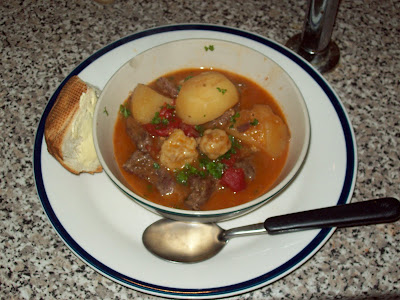
I spent a year in Athens as part of the Erasmus programme. This basically involved me lying around getting drunk and sunburnt and not doing a lot of work. It was a lot of fun and my friends had an idea for something to do for Christmas.
I had met friends from all over Europe, so my Hungarian friends Kinga, Zsofi and Klari thought it would be fun to have a party where we could all bring or make some food from our home countries. My friends hosted the event and made this AWESOME gulyas (you know it as goulash), which was good because the Hungarian boys brought pizza. It's basically a spicy beef stew and it's perfect for a cold winter's day; I just hope it's up to their standards!
Ingredients:
For the gulyas:
- About 750g braising steak or stewing beef, cut into bite-size chunks
- 1 tbsp hot Hungarian paprika (the stuff that really blows your balls off)
- 1 large onion
- About 3 tbsps plain flour
- 2 big garlic cloves
- 4 medium red potatoes, peeled and cut into chunks
- 2 bay leaves
- Jug of good quality beef stock (I'm not sure of the exact amount but you need enough to almost cover the meat and vegetables)
- 1 green pepper
- 2 tins of Italian plum tomatoes, drained
- Salt and freshly ground black pepper
- A generous handful of flat-leaf parsley
- 1 large egg, beaten
- 2 tbsps water
- 1/4 tsp salt
- 8 tbsps plain flour
- Heat some vegetable oil in a large casserole to a high temperature (if you like heart attacks you can use lard, which is the traditional Hungarian way).
- Put some plain flour in a bowl and season it well with salt and pepper. Toss the beef in it, making sure it's well covered. When the oil is hot, brown the beef for a few minutes on all sides and remove to a plate when this is done. The beef should sizzle vigorously on contact with the oil - if it doesn't, take it out quickly and let the oil heat up more, otherwise your beef will just leak its juices into the pan; the idea is to seal all of those juices in. You may have to do this in batches. Use tongs to make sure the beef is properly browned with a nice little crust before you turn it over.
- While the beef is browning, peel and chop the onion into half moons. When the beef is all browned and removed to a plate, put your onions into the pan with the peeled garlic gloves and bay leaves. Fry for a couple of minutes until fragrant, then reduce the heat and put the lid on the casserole. Let the onions caramelise slowly and stir them every now and then.
- Meanwhile, chop your green pepper into strips.
- After 30 minutes of caramelisation (you love it!) add the paprika. When the paprika is fragrant, raise the heat, add the potatoes and green peppers and fry for a few minutes.
- Add the tomatoes and fry them off for about 10 minutes to get rid of that acidic flavour they can have, then add the beef back in. Cover with the stock, bring to the boil and then reduce to a gentle simmer. Let it cook slowly on a low heat for about 1 and a half hours, skimming fat from the surface every now and then, until your meat and vegetables are tender enough to be cut easily with a spoon.
- While the gulyas is cooking through, make the csipetke. Mix the egg, water and salt together in a mixing bowl. Add the flour and knead until you have a stiff dough. NOTE: the quantity of flour I've given here is only a rough estimate; the original recipe I used suggested using 6 tablespoons, which was nowhere near enough. Wrap the dough in cling film and leave it in a warm place for 30 minutes, then make little balls with your hands. Put these balls in the gulyas for the last 15 minutes of cooking.
- Garnish the gulyas with some roughly chopped parsley and serve it with some nice crusty bread to mop up the residual sauce.

